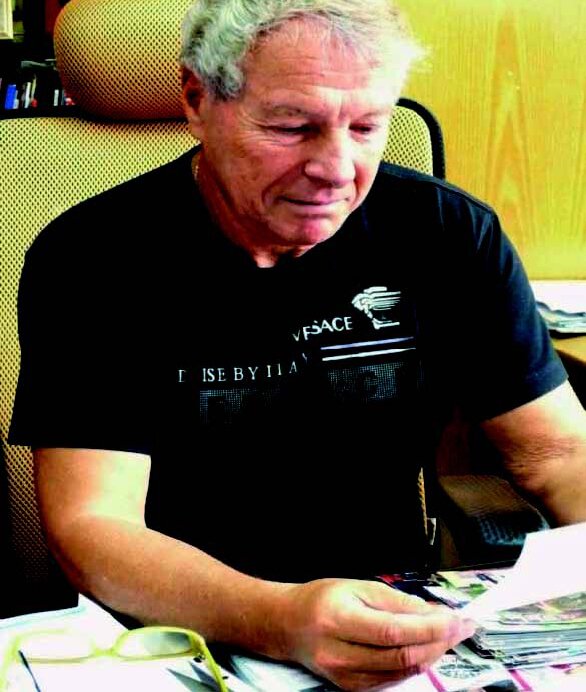| Silvain Gilbert telling his story of survival as a Hidden Child - Part One |

|

|
|
Hong Kong resident Silvain Gilbert lives out on Clearwater Bay and enjoys a daily swim, though not when it’s below a certain temperature as the territory has experienced early 2010. He looks fine. His appearance though belies a traumatic childhood as he fi gures among the multitude of Jewish people who lived or were born in the period of WWII and happened to be in Europe, under the heavy boot of the Nazi Germans. Gilbert tells his story to Jewish Times Asia about his personal account and experiences as a child growing up in Belgium. (This is part one, his return to the village of his saviour will be told in the next issue). Gilbert was born in 1937 in Antwerp, Belgium, then one of the biggest harbours in the world. In 1942 at the start of what the Germans called The “Final Solution,” which meant the deportation of all the Jews to concentration camps and the killing of them, Jewish families were confronted with something that had never happened before. Here is Gilbert’s thoughts and recollections in his own words:
Behind the monstrosity of the holocaust and the statistics and the awful history telling that the Nazi Germans murdered six million Jews, nearly two thirds in Europe that were occupied, there is the further terrible number that among those killed one and a half million were children. A child is born innocent and doesn’t know what life is about or what it means to be Jewish, or anything about life and death. Suddenly, you were not a citizen in your own country, you had lost your identity and all your belongings. They came in the middle of the night, breaking your doors and windows, One-to-One Interview Silvain Gilbert telling his story of throwing you into a truck and sending you by coal wagon to a concentration camp. I was born into a family with an elder sister, and my parents were in their early thirties. Suddenly I was sent into a clandestine life. In Antwerp the Germans had the help of the local police, and even the mayor of Antwerp, with the Flemish police exporting the Jews, not the Germans, and that was a big difference. It started with anti-Semitism all over Europe and in Antwerp. What was one to do and how to save yourself if you had no home, no money and on your ID card they put a big J meaning Jew. This was done in whatever language to identify you. In reality you were not different from anyone else, in my case, I was only a fi ve year old child. How was I to understand this? How does a small child understand life and death? You are just a little kid and suddenly there is a death penalty imposed. Death penalty anyway is for murderers, for monsters and all, but for a child of that age? Just because this particular child is born Jewish, there is the death penalty. This is something the world should try to understand, how parents can give comfort to myself and my sister who was only ten years old. What was happening and why? Then we were suddenly abandoned, nowhere to hide, no ID cards, which you need for ration coupons to get food. We were not citizens of the country anymore we could not get food coupons. A Jewish mother could not give birth in a maternity hospital, nor any hospital, you are nobody and that is very diffi cult to understand for a child. As a citizen in a country the Jews were not allowed to exist. Going underground takes some organisation. There were 70,000 to 75,000 Jews in Belgium, in Antwerp and its suburb alone about 35,000. In the month of September, 17,000 Jews of Antwerp were deported to Auschwitz. (The main place where 25,000 Jews perished during the Shoah). In Gilbert’s case he was a little more fortunate. His father had a business partner, George Smeyer and they were in the diamond industry and Antwerp was then a centre of the diamond trade. His partner was Flemish not Jewish. Gilbert recalls: when we fi rst had to go into hiding, I was hidden with George Smeyer and my sister was hidden with his sister. My mother succeeded in escaping when the local police arrived looking for Jewish families by taking the garden way out. She went to George Smeyer. My father was already in a camp, not a concentration camp but a hard labour camp in the north of France near Boulogne. In the summer of 1942, two months before, they took all young Jewish men there were several thousand and sent them to a camp in Dannes-Camier to build bunkers. My father succeeded in escaping but that is another story. However, this left my mother alone so we had to fi nd a place to hide. At that time there were Jewish partisans in an organisation for children (O.N.E) that helped the Jews in various ways, for example helping young mothers to get milk, things like that. Also the Christian churches, Belgium being 99 per cent Catholic were asked to volunteer to save Jewish children. Fortunately some did, everything had to be organised in very little time. There were some convents, some monasteries, also other Christian institutions that opened places and there were families willing to take the considerable risk to hide a child orb children. In my case there was a lady who was 65 years of age, single, never having married and she was living in a tiny little village of 1,200 people in the south part of the country called Walloon. The village name was Mont St Guibert and this village saved 21 Jewish children. Many families in that one village openly volunteered and risked their lives saving those children. If the Germans had caught them they would have been deported or killed. And proof of that is the priest who came to bring us to a meeting point, to take us to the village of Mont St Guibert, which is about 60km south of Brussels. With no papers, nothing, bringing people from the north of the country to the south was really very risky and when the Germans caught that priest he was killed. What is interesting now is, on asking those people after the war about their motivation, why, they simply said, “How can we accept that innocent children should be killed?” They didn’t think about their actions. It was spontaneous. The lady that saved me and my sister was a devout Catholic. So we arrived in September 1942, and we were separated from our parents. My mother visited us a few times but it was very risky for her. My reaction at the time was to deeply question why I cannot stay with my parents, my mummy and daddy, what’s wrong? Did I do something wrong, am I guilty? They could not explain and there is so much left unexplained still today. Every hidden child all 3,500 Jews in Belgium were saved like this. Everyone has the same traumatic experience, the separation they had, no one can replace your parents. It was a shock that we were suddenly in a new place that looked very peaceful, very serene. You see the countryside and not the city, with horses, so different and so far away from the big city. In fact it was also a shock to be suddenly with a lady 65 years old. When you are only fi ve, a woman of 65 years looks very old. In those days people’s life, their longevity was not like today, people really looked old. My parents were young and that was what I was used to. But, we had to adapt. Not only to the physical situation, which was one thing but to adapt to the language as we were speaking Flemish or Dutch you can say, and Yiddish, and suddenly we had to speak French with a local dialect Walloon, which was a sort of French but quite different. On top of that we had to fi t in like any other child in the village, we could not be different. Physically we were not different. But my parents were traditional Jewish and suddenly I had to pray as a Catholic, before meals, and in the evening before sleeping. We had to pray all the time because our foster mother was very devoted to her faith. We had to go to mass on Sunday, not once but three times, and we had to learn the Catholic catechism. We were with nuns when we went to school and I even had to help the priest as an alter boy. Something which is quite funny is a picture of me parading through the village with the Virgin Mary statue. I became completely Catholic and still now today I can recite the prayers and know all the details about the Catholic faith. One of the girls was from Brussels she was eight years old her mother was already deported. Her father survived while her brother was hidden with another family which also saved four children. The other girl who we called Suzanne, we were not sure if it was her real name, for example my sister’s name was Toni and it looked a little bit German so we changed it to Marie-Antoinette. Our lady protector was living with an old lady cousin who was sick, she could not do anything and in fact she passed away in 1946, just after the war ended. This lady we called “Tante Fanny” (Aunt). Today it looks strange but we also changed our family name, Silber became Gilbert. Being Jewish we had to change our identity. And that is something very hard to accept, changing your identity. When people call your name, you have to react. Thus we survived the war, my father succeeded in escaping from the camp in France and got back to Belgium to find my mother in Brussels. They located a place to hide where they stayed during the war but towards the end my father went once onto the street and was captured by the Gestapo. He was tortured because he had fake ID papers. He admitted he was a Jew, and again he was put on a train but somehow he succeeded to jump from the wagon, at night. In fact, it was April 1943, on the eve of the Passover, that he jumped and came back home where he remained during the war. We were lucky as we survived and that was number one and we found our parents after the war. Most children did not find their parents. The trauma was there all my life and the best proof of this is that it took me a lifetime to go back to the village of Mont St Guibert.
(Issue March 2010)
|

















